Trump on TPP hit the headlines during his first day of presidency. This move is in fulfilment of his promise that scrapping the TPP is one of the very first thing he will do as president.
True to his word, so he did.
But what could be the implication of this decision to the USA?
Here’s a glimpse of what we had in mind.
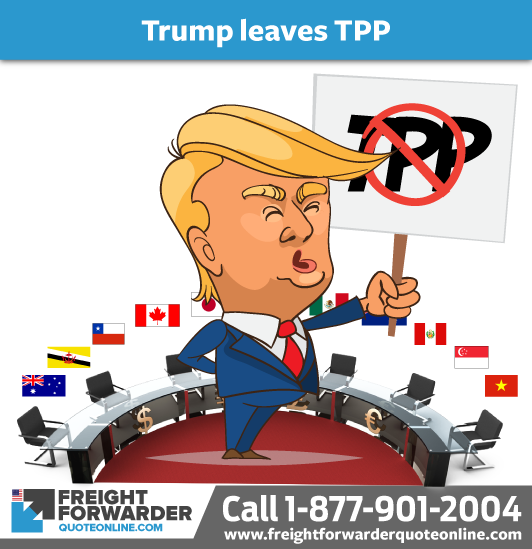 Is this good or bad for USA’s economy?
Is this good or bad for USA’s economy?
Why did Trump ditch the TPP?
Trump’s decision to withdraw from the Trans Pacific Partnership (TPP) Agreement, didn’t catch many by surprise. On the contrary, this was something the world was expecting to happen.
It was always included in all of Trump’s campaign policies where he fiercely attacked the government for pushing hard on its ratification amidst the loss it will bring to America.
He claims it will hurt American workers and undercut US companies. He further believes that the average American farmer and auto worker got robbed of their jobs because labor is cheap in developing countries like China, Vietnam, and Malaysia. This prompted manufacturers to transfer factories to these countries, thus the increased unemployment rate in the country.
Well, this could indeed be a fact. But we are yet to see if abandoning TPP will indeed increase the employment rate of the USA.
Trump on TPP and the Policy of Protectionism
The USA is applauded by almost all nations for its big support for free trade and globalization. That is, of course, during the era of previous presidents. But under Trump’s presidency, it seems that the US government is going back in reverse and is now promoting protectionism.
Is this good or bad?
Some think that this is a bad move for the USA at it will restrict trade for the country; however, Trump believes his negotiating power is more than sufficient to win the other countries into entering a bilateral agreement with the USA.
In Eric Bradner’s article, Trump’s TPP Withdrawal: 5 things to know he stated,
“Trump’s bet is that, through his negotiating prowess, force of will and willingness to walk away from the table, he can convince other countries to accept terms that previous presidents — from George H.W. Bush and Bill Clinton on NAFTA to Barack Obama on the TPP — have not been able to achieve.”
This may be the case, as we see several countries already wooing his favour.
Trump on TPP and the rise of bilateral agreements with the USA
Now that the TPP is dead in the waters, Trump is hopeful that the USA will easily convince other nations to have bilateral agreements with them. Let’s take at the probability of this to become a reality beginning with the participating members of the TPP.
Japan – USA Bilateral Agreement
Prime Minister Shinzo Abe is already set to meet Trump on February. He has initially stated that TPP is “meaningless” without the USA.
This makes it a potential win for Trump as he may convince Abe to favor a bilateral agreement with the USA.
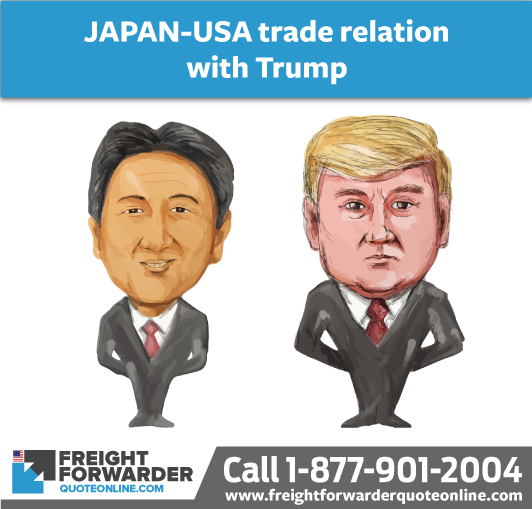 Is this good or bad for Japan and USA’s trade relations?
Is this good or bad for Japan and USA’s trade relations?
Mexico – USA Bilateral Agreement
Mexican President Enrique Peña Nieto announced that his government will negotiate new trade pacts with signatory nations of the Trans-Pacific Partnership. But it doesn’t exactly mean having a bilateral agreement with the USA.
After signing the USA withdrawal from the TPP, Trump has announced his desire to build the USA-Mexico border wall. This further created a rift between the relationships of the two countries.
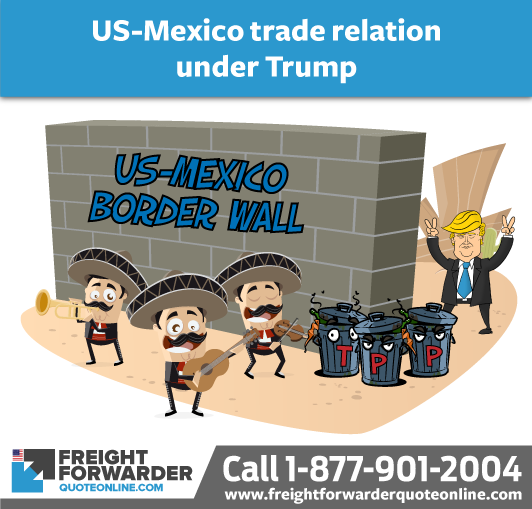 Is this good or bad for Mexico and USA’s trade relations?
Is this good or bad for Mexico and USA’s trade relations?
Mexico may have other free trade deals with several countries and its proximity to the US market have made the country a top destination for international automakers, who also take advantage of comparatively low labor costs. But with Trump on the lookout for this, Mexico may need to find other ways of supporting its economy, unless it agrees to the conditions set by the USA.
Canada- USA Bilateral Agreement
With the TPP ditched, does this also mean the death of the North American Free Trade Agreement (NAFTA)?
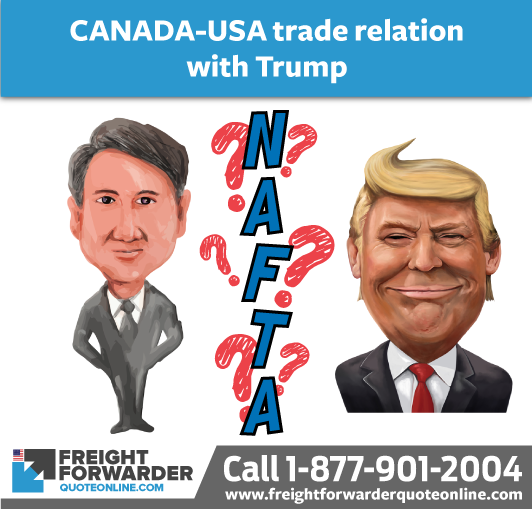 Is this good or bad for Canada and USA’s trade relations?
Is this good or bad for Canada and USA’s trade relations?
Canada is one of the largest US trading partner and exporters of US goods.
Asked if they are worried they’ll get hit with Trump’s protectionism policy, this is what Christopher Sands, Director of the Center for Canadian Studies at Johns Hopkins University in Washington has to say.
“Canada was never on Trump’s hit list – to some extent, he actually sees Canada as the USA’s number one customer. He wants to bring jobs back to the Midwest, and it’s difficult to see how he would do that without the Canadian market.”
It seems we will still see good a good relationship between Canada and the USA. Well sort of, that is before the Prime Minister of Canada made this tweet after Trump declared its immigration travel ban.
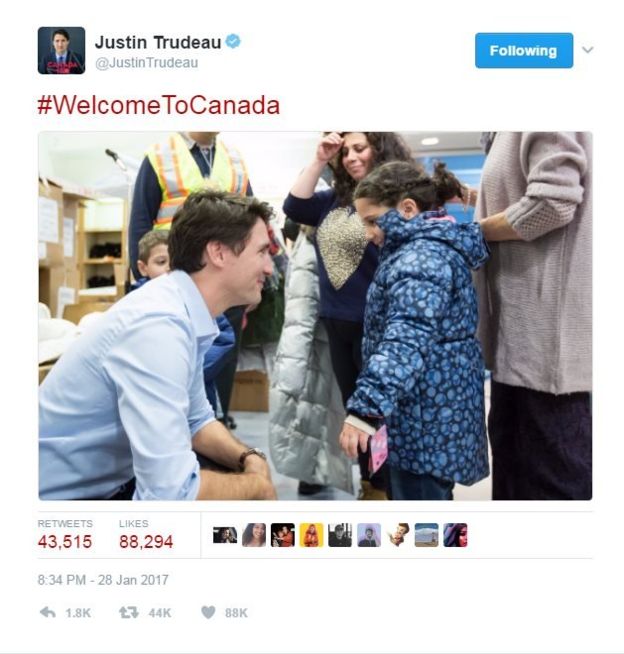 Trudeau welcomes refugees via tweet
Trudeau welcomes refugees via tweet
So it seems nothing is certain yet between these two countries, too!
Australia – USA Bilateral Agreement
The United States-Australia Free Trade Agreement (AUSFTA) entered into force on January 1, 2005. This is several years earlier than the creation of the TPP.
The result is an export of more than $1billion from five Australian states as shown in the illustration below.
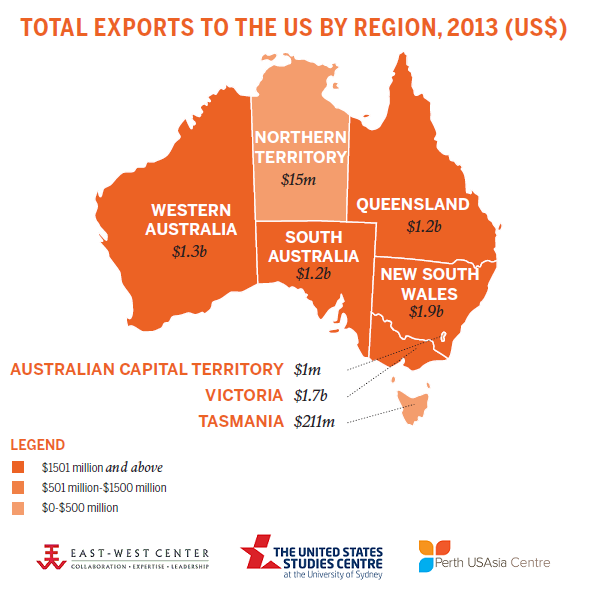
Undeniably, Australia relies heavily on the goods exported to the USA and the TPP ratification could have given them more leverage. However with the USA leaving the TPP, these additional benefits may soon be forgotten.
Do we see Trump negotiating the current FTA with Australia? This is something we are yet to see.
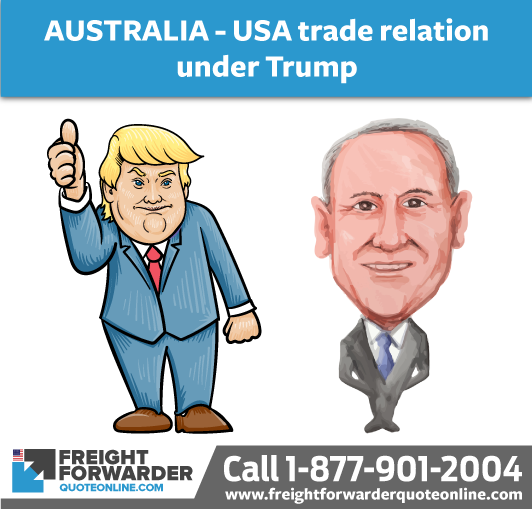 Is this good or bad for Australia and USA’s trade relations?
Is this good or bad for Australia and USA’s trade relations?
Where will Trump’s protectionism lead the USA’s trade and economy?
Now that the trend has shifted towards protectionism, what effect will it bring to the trade and economy of the USA?
Trump earns several supporters by ditching TPP
By abandoning TPP and focusing into bringing more jobs to the USA, Trump has earned a couple of supporter, which includes Senator Bernie Sanders.
“Now is the time to develop a new trade policy that helps working families, not just multinational corporations,” Sanders said in a statement. “If President Trump is serious about a new policy to help American workers then I would be delighted to work with him.”
Teamsters General President James P. Hoffa also applauded this decision by Trump.
“Today, President Trump made good on his campaign promise to withdraw the United States from the Trans-Pacific Partnership. With this decision, the president has taken the first step toward fixing 30 years of bad trade policies that have cost working Americans millions of good-paying jobs.” he stated.
How will this affect industry and trade?
The labour section is rejoicing with this news, but some businesses are not so very happy with this decision such as the following:
Auto Industry
USA automakers have longed hoped that tariffs from Asia be slashed due to the TPP ratification. But with the USA abandoning it, the Center for Automative Research (CAR) has this to say:
“If the U.S. were to enact a 35 percent tariff on light vehicles imported from Mexico, CAR estimates the sales impact would be 450,000 units in the United States, and an implied loss of nearly 6,700 North American assembly jobs.”
CAR further fears Trumps potential decision to leave NAFTA, too.
“If the U.S. leaves NAFTA, companies in Mexico and Canada may seek alternate, more affordable places to purchase these goods, such as China, India, and other regions with large, international U.S. competitors.”
Nevertheless, this seems to be in contrast to what have happened with General Motors (GM).
Prior to scrapping TPP, Trump has already threatened GM of higher tariffs if it continues its plan to outsource its auto assembly in Mexico.
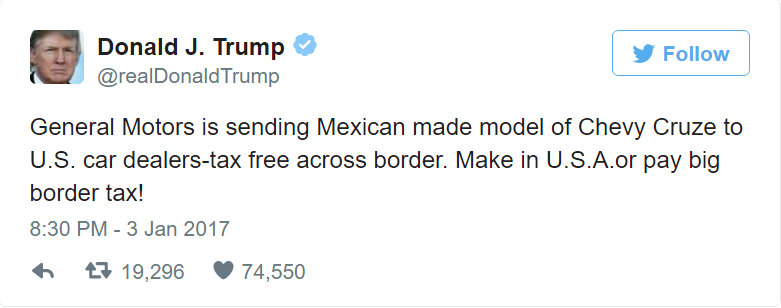
Trump’s tweet about General Motors
As a result, GM will invest $700 million to expand its existing facility in the US state of Michigan instead. As a result, an estimated 700 jobs in the US will be created.
So this seems to be good news for Trump, as his strategy to create more jobs for the USA is quickly being realized.
The agriculture industry
Farmers across the country are already struggling with large grain surpluses and shrinking incomes. Thus they saw TPP as a savior of the industry as it promises lower, if not zero taxes, for their products while opening up new markets to sell to, like Vietnam.
John Jenkinson a farmer and agriculture expert stated,
“We could end up with more piles of grain just like the one you see behind me because we export over 50 percent of our wheat and 50 percent of our soybeans outside of the United States.”
Without new markets to sell to, another big harvest would just increase the existing grain surplus adding insult to injury.
The pharmaceutical industry
Pharmaceutical drug-makers are also disagreeing with this decision.
TPP would have lessened the competition from in-coming generic because of the longer patent protection pharmaceutical companies will have on certain drugs. In a statement made by the Generic Pharmaceutical Association (GPhA) they said,
“Increasing competition from generic drugs and biosimilars is a proven way to lower health spending. We look forward to working with the Trump administration, bipartisan members of Congress and others on policies that encourages access to more affordable medicines in the United States and around the world.”
So it seems that while the pharmaceutical industry sees this as a loss, the healthcare industry sees this as a win.
The tech industry
As for tech companies, including Google and cell phone providers, it would be fairly difficult for them to lessen regulations and gain entry into some of participating TPP members.
Carl Guardino, president and CEO of Silicon Valley Leadership Group has this to say,
“45 million American workers, 105,000 in (Silicon Valley) alone, should be crying (over) this executive action today,” Guardino said, “and the main constituency that will be smiling is the Chinese government, who is already stepping in, pursuing unilateral and multilateral trade deals with the TPP countries that will be bad for American workers, employers and the economy.”
There are approximately 105,000 jobs that are directly dependent on foreign trade in the Silicon Valley. Without these data provisions and protections, countries can easily force the US companies to hand over their intellectual property as condition of doing business in their market. This puts the company and the customer’s privacy at risk.
The trade industry
The trade sector has also responded. FedEx CEO Fred Smith, stated in the published article via Reuters
“The United States being cut off from trade would be like trying to breathe without oxygen.”
He argued that approximately 40 million Americans have jobs because of trade. The benefits it brings towards the USA are “more diffuse and harder to see than the pain in areas like manufacturing.”
The Labour Industry
There’s no doubt about it. The labour industry is all words of praises for Trump for this momentous move. They have long argued that the Free Trade Agreement is one of the main reasons for the trend of shifting American manufacturing jobs overseas to nations with lower wages and fewer labor protections.
Conclusion
Over the past week immediately after Trump’s withdrawal from the TPP, the stock trades sow lowered investments. The S&P 500 was down 0.34%, the Dow Jones Industrial Average fell 0.2%, and the Nasdaq added 0.12%’ while the the Volatility Index increased 5% as mentioned in ‘The Street’.
However, what’s rocking the US economy now is not US withdrawal from TPP, rather it is his travel immigration ban.
So where does this lead the USA? It is still too early to assume.




